The Shark shares new insights on boosting your game, health, wealth and happiness.
Sir Winston Churchill once said, “Success is walking from failure to failure with no loss of enthusiasm.”
It’s a line that’s sure to resonate with Australian golf icon Greg Norman, a perennial recycler of motivational literature and a man who has experienced more than his fair share of bumps and bruises on his way to the top.
Indeed, if you were to draw up a list of the nation’s most successful Baby Boomers, the world’s most successful athlete-turned-entrepreneur is one of the first names to make the cut.
Success, of course, should not merely be judged by financial status – although Norman’s global business empire has fetched him an estimated net worth of $500 million.
Despite his fortune, Norman will be the first to tell you his climb to the summit of world sport and business – and more recently, Instagram – hasn’t come without its hurdles. But it couldn’t have come without a steely determination to get back up and try again. He also couldn’t stay there without all 64 years of his life experience.
Blessed with prodigious golf talent and business acumen? No question. Appreciative he was born on February 10, 1955? Absolutely.
“I truly have been blessed to be born when I was because it’s allowed me to establish a 50-year lifestyle as a Baby Boomer and put me in the position I am today,” he concedes, perched on a bench in his home gym.
Like he did on the fairways, Norman felt indestructible off them in his heyday. Not even the recession in the early ’90s – the worst since the Great Depression – could slow down the Great White Shark, whose bank account was soaring with his world ranking.
As families were forced to tighten the purse strings and face the economic downturn head-on, Norman was busy winning tournaments and cashing cheques, oblivious to the troubles outside the PGA Tour bubble. He was, as he puts it, “recession-proof”… living the high life of a professional golfer.
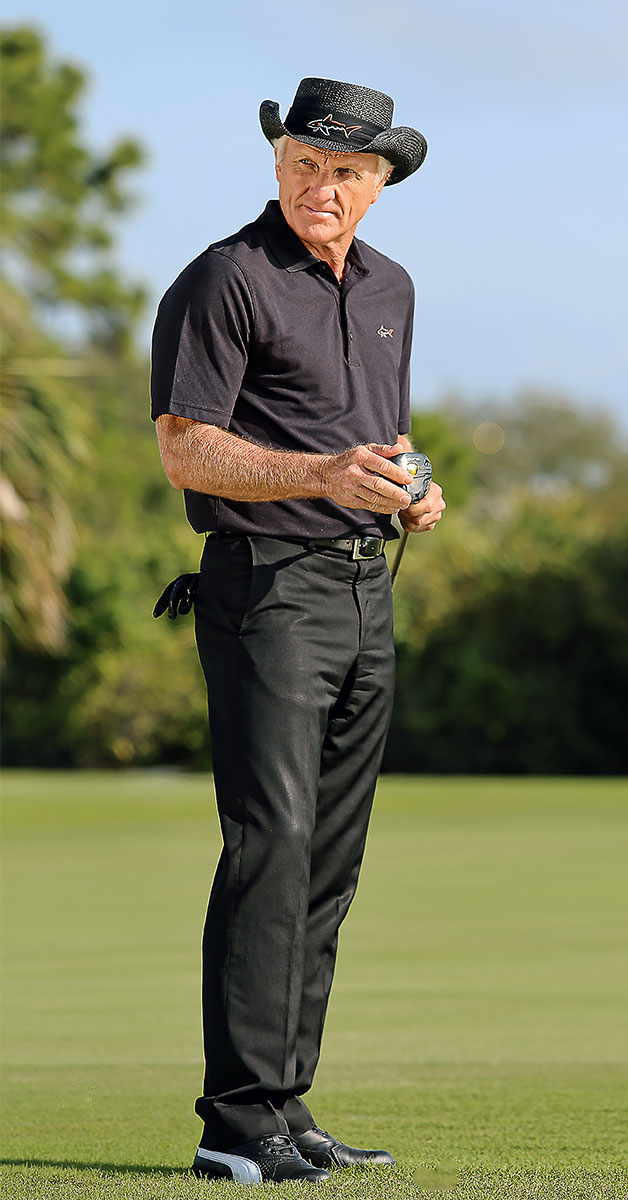 “It was the same for a lot of athletes around the world at the time,” Norman tells Australian Golf Digest. “They would all look back now and think, Wow, I was successful irrespective of what was happening in the world. Yes, I was recession-proof in a lot of ways, but it’s no different to today’s athletes, right? People still go and watch the sports they want to watch, and the athletes still get paid for performing. Even during the 2008/2009 global financial crisis, athletes still kept winning and they still got paid.”
“It was the same for a lot of athletes around the world at the time,” Norman tells Australian Golf Digest. “They would all look back now and think, Wow, I was successful irrespective of what was happening in the world. Yes, I was recession-proof in a lot of ways, but it’s no different to today’s athletes, right? People still go and watch the sports they want to watch, and the athletes still get paid for performing. Even during the 2008/2009 global financial crisis, athletes still kept winning and they still got paid.”
But perspective has a funny way of changing with time. Norman is no longer the sport’s torchbearer. Consequently, he’s no longer recession-proof, in theory at least. What he thought was ruthless opposition on the fairways – special shout-out to Nick Faldo – is a far cry from the business types he now locks horns with on a daily basis in the boardroom.
“Now that I’m out of the game of golf I’m not oblivious to recession,” he admits. “The things that I see today are totally different to how I saw them in my younger days.”
The fact that Norman became the pioneer of athlete-brand building speaks glowingly about his ability to see an opportunity and jump on it. Among his current multi-million-dollar empire is ‘athleisure’, real estate, golf-course design, food and wine, not to mention a bunch of ambassadorial roles, most notably his recent appointment as tourism ambassador for Vietnam. Not a bad portfolio for a country kid who earned his first dollar stripping bark off hot logs in a match factory before accepting a $28-a-week gig as the assistant pro at Royal Queensland Golf Club.
Norman isn’t the first Baby Boomer to capitalise on his date of birth. Many readers of this magazine are now enjoying the fruits of their labours and deservedly so. Yet Norman has more life lessons to share than most, and he delivers them in such a way that it’s impossible not to be glued to his every word. Of course, the hardest part about offering advice when your personal success has reached stratospheric levels is ensuring you don’t come across too condescending in your delivery. It was something Norman was acutely aware of during this interview. But as we learned, dig beneath that hard-nosed exterior of the bulging, blond ball-striker of yesteryear, and you’ll quickly realise Norman remains as laidback and “Aussie” as the day he departed our shores.
Don’t believe us? Well here’s a little secret: Norman is currently searching for his dream property on the Sunshine Coast that he and wife Kirsten can call home when he needs a break from the office. And get this: he even wants his ashes to be scattered “somewhere back home” when his time is up.
You didn’t know that, did you? Here’s what else you can learn from a bloke who attacks life like no other…
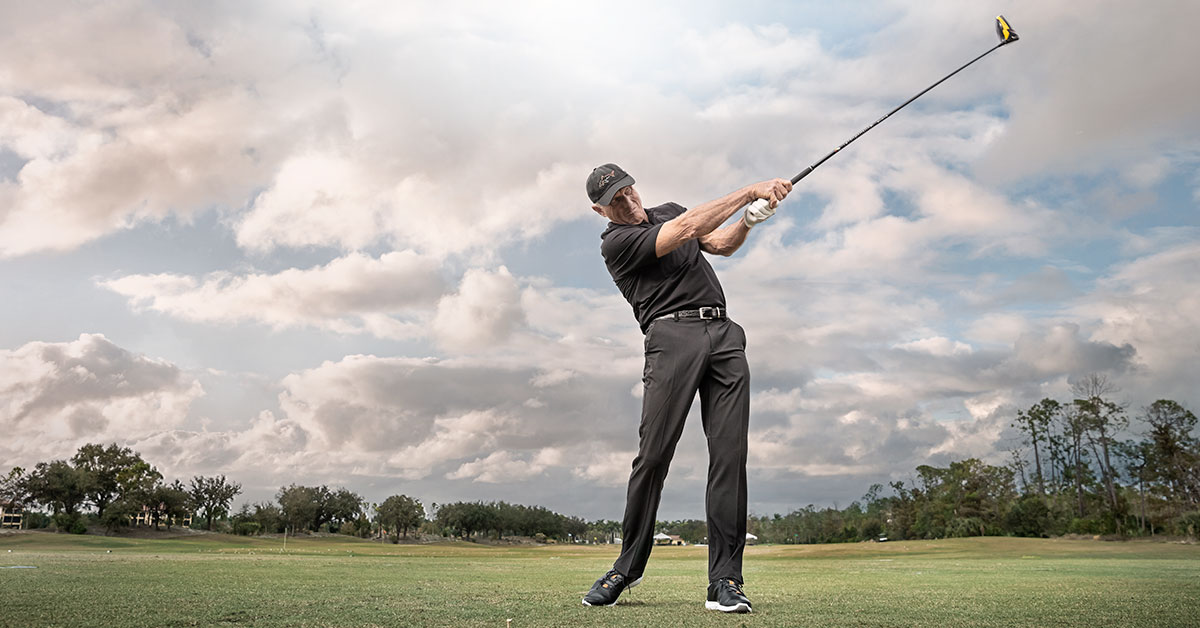
On playing better golf…
At the end of each season, I took a pencil and paper and made a brutally honest appraisal of the state of my game. If you’re serious about wanting to improve your play, you should do the same thing.
Divide your game into driving, fairway woods, long irons, middle irons, short irons, wedge play, bunker play, chipping, putting and trouble play. Then give yourself a handicap in each area. If you’re a 15-handicapper overall but have a reputation as one of the best putters in your club, go ahead and give yourself a 5 or maybe even a scratch handicap in putting. But be honest on the other side, too – if bunkers have you completely baffled, don’t rate yourself better than a 30 in the sand.
This exercise in honesty will do two things for you. Number one, it will instill you with a feeling of confidence in the areas of your game that are relatively sound. Even if you already have that confidence, the exercise of actually writing a low number next to your strengths will reinforce the feeling. Secondly, by coldly and candidly recognising your weaknesses, you’ll be taking the first step towards strengthening them. From this point, you can establish a game-improvement agenda for the next season – lessons, drills, a golf school, a practice program, etc. Whatever it may be, it should focus on these acknowledged weak points of your game.
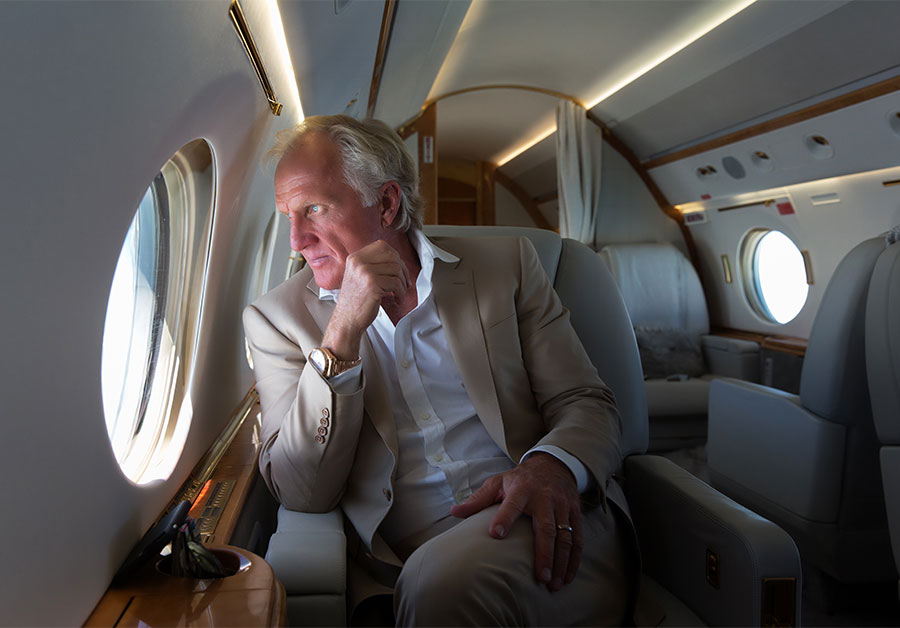
On how to find your happy place…
The definition of happiness is just being comfortable with yourself. Are there times when I feel stressed? Damn right there are times I’m stressed. Every human being on this planet experiences stress to some degree. At the end of the day you’ve got to be able to understand why you’re under stress and how you’re going to pull yourself out of it. Is it you, or something going on around you? Is it something forcing you to feel that way? Is it some business deal forcing you to feel that way? Once you identify the cause you can work on alleviating it. For me, happiness comes from within. If I can compartmentalise and keep the shit away from myself, like the stress, and identify and fix it without letting it affect anything else, then I’m in a good place.
On the root of all evil…
Was I ever truly at my happiest as a professional golfer? Well, I was before I understood all the bullshit about management and all the other stuff that came with it. Once I started to understand the other side, once I started to understand that money is the root of all evil, only then did sit back and think, money isn’t everything. If you do certain things the right way, ethically and morally, then you’re going to make the money anyway. It wasn’t like I went after things for money. I went after things because I knew they were the right things I wanted to do. Money was, and always will be, a by-product.
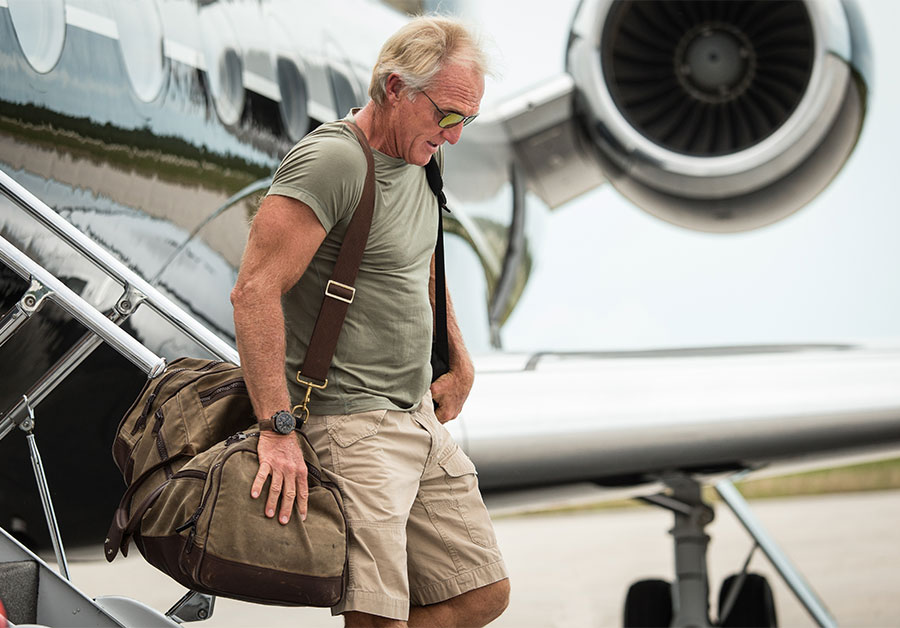
On paying it forward…
Golf is at the low end of the totem pole for me now. Just today I was asked to go play golf with a couple of mates and I just had to say no, I had too much work to do. I’m working long days and always catching up on my business e-mails on weekends. I just have to park golf aside because, for me now, my primary focus is my business and my legacy. Part of that has been developing a taskforce to see what we can do to help the northern Bahamas recover for the next 10 years after the devastation of Hurricane Dorian. It’s great that everyone is jumping up and down offering help but you’ve got to develop a masterplan on how you’re going to roadmap this thing moving forward – how can we create a sustainable development platform to rebuild the Bahamas. Fortunately, I’ve got a lot of great partners over here that I might be able to tap into. I guess it’s my way of paying it forward.
On turning his name into a brand…
I realised in the beginning while I was with a management company that they were never going to put equity into my brand. Management companies are always going to put equity into their own brand because that’s their business, right? An athlete is just a pass-through entity in time… you have a limited shelf life. I recognised this very early on and I was seeing how much money other people were making off my name or off my position, capabilities and delivery. I decided it was time to look ahead 30 to 40 years, to really look into my future. It was then that I made the decision, in 1992, to not re-sign with my management company and go it alone. I financed everything myself. I found the right people that I thought could help me build my own brand and together we started that process of valuing my name.
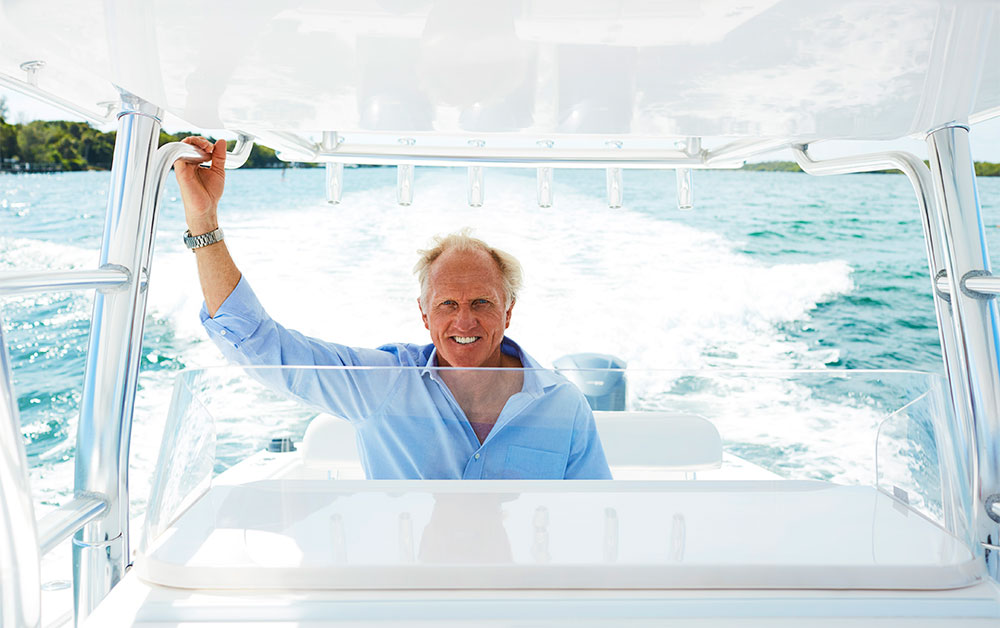
On how he made his first dollar…
I started off like any other Aussie kid – getting my hands dirty for a few paltry dollars. I worked in a match factory. I was stripping bark off hot logs between my knees with a peeling iron. It had two handles on it, and I would use claws to pick the logs up out of hot water and put them between my knees. Then I pushed down on the blade and twisted, and the bark would come off. I would then put the log on a roller which would skim off the thickness of a match before it would go through another machine that would make the final product that we know and see as a match.
On the importance of thinking long term…
Whatever I do in the business world, and our Bahamas project is a great example, it’s not what we do today that is extremely important, it’s the long-term view – the 10-year horizon. I talk to my team about my 200-year horizon and the legacy of the brand. At the end of the day, if I structure everything correctly now, I know when I’m pushing daisies up with six feet of soil on top of me – that will never happen, actually, because I’m going to be cremated and have my ashes scattered somewhere over Australia – but at the end of the day I know everything will be in place as a result of what I do today. It’s like my 1998 Presidents Cup duel with Tiger Woods – it’s not about me, it’s about the team. Don’t make this a one or two-man show. I do the same thing with my business: consolidate now and really look at how we want to do things in the future.
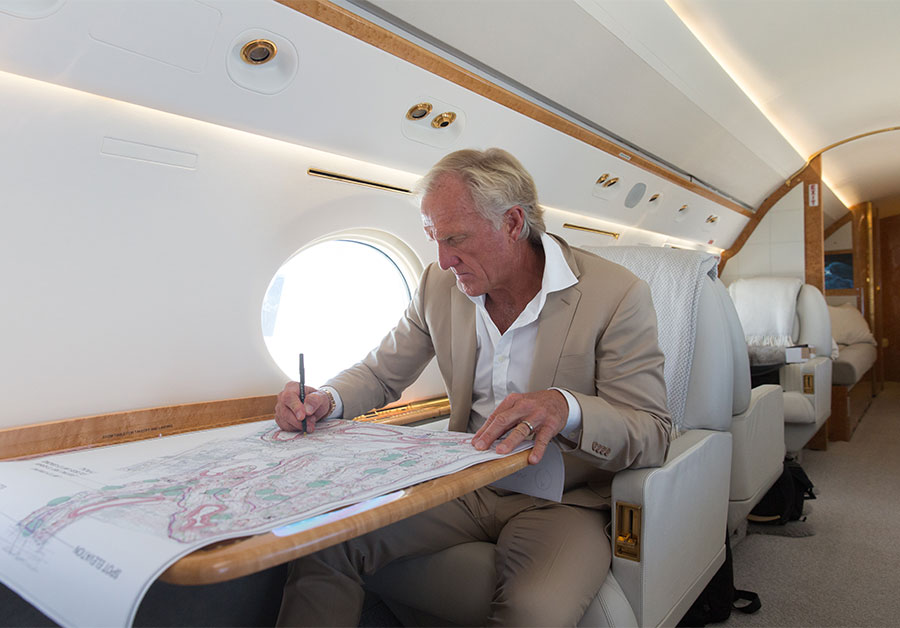 On providing for future generations…
On providing for future generations…
Paving a financial platform for your family and their future families is an interesting discussion because you’ve got people like Bill Gates, for example, who isn’t giving any money to his kids. But at the end of the day people like that own corporations that their kids will one day inherent. Now in my case, while I’ve been blessed with my career, and I’ve said this a couple of times, I honestly don’t think anyone else could have done it the way I have because I did it myself. I’ve been able to play golf for a living, create a brand and a platform for my family to have an opportunity to work under me. Never in my wildest dreams did I ever think my son would be in business with me or that my daughter would be looking after my wine business or that my son-in-law would be the COO of my company, or my wife could work with me – all these people I pay salaries to. It’s such a great feeling to know I have created something from absolutely nothing outside of hitting a little white ball from point A to point B better than most.
It’s such a great feeling to know I have created something from absolutely nothing outside of hitting a little white ball from point A to point B better than most.
On watching his son follow in his footsteps…
I financed my son’s Shark Wake Parks business that he’s very, very passionate about. As a father there’s nothing better… You go finance a business with millions and millions of dollars in the belief your son has the same drive as you. And he’s learning. He’s making a lot of mistakes but he’s also chasing his passion – no different to what I did. To be able to give my son that opportunity, not just from a financial security standpoint but giving him 51 percent of the business and ensuring he has all the back-of-house stuff like lawyers, accountants, advisers and executives to help him navigate this start-up company, that’s got him to a point now where, in a matter of a few years, he’s bringing in revenue in excess of seven figures… it’s pretty impressive.
On his rules for investing…
When it comes to investment, don’t do anything you’re not passionate about or not knowledgeable about. You’ve got to know where your money’s going. You’ve got to decide whether you’re going to be a passive investor or invest to be an operator. If you’re a passive investor you’re at the whim of someone else’s decisions. If you become the operator it becomes a significantly bigger burden to do it because of the roles and responsibilities that come with it and the risk management that comes into play. If you get it right, it’s fantastic. If you get it wrong, you’re going to lose your money. You’ve got to do your due diligence – understand you are going to invest in a space you love. Where I’ve been successful is identifying virgin space that nobody has gotten down and formulate a strategy and execute on a business model. It doesn’t happen overnight, it takes years – sometimes five to six years. I’m very comfortable with my investment portfolio. Now it’s just making sure I get my returns, whether it’s a 3x, 5x or a hail Mary at a 16x return… it’s about management and making sure those investments come to fruition.
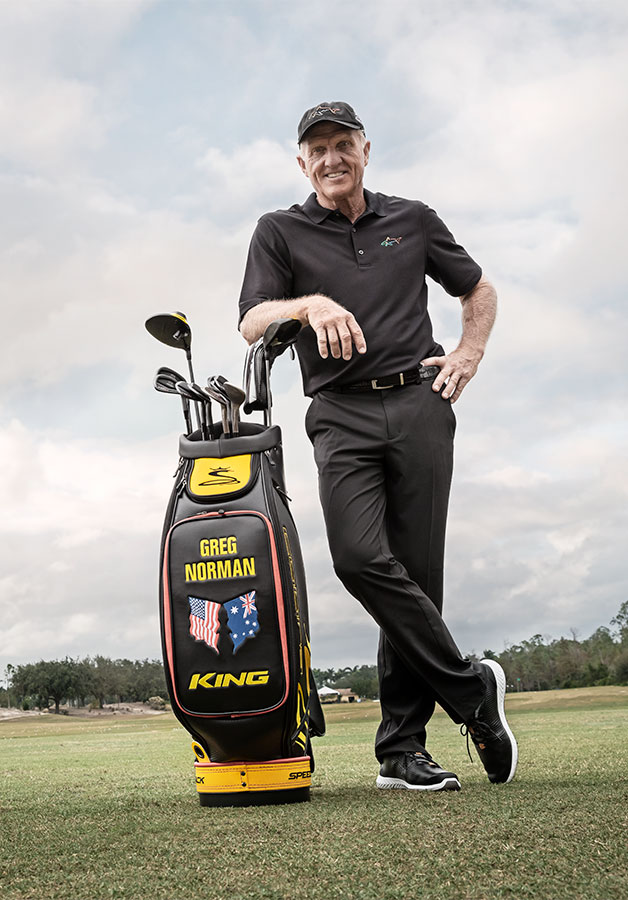
On turning $10,000 into $100,000…
If you came to me with this scenario, the first thing I’d do is ask you if you want to do it in energy or tech or… what segment of the market do you like? Do you like equities? If you want to get into equities, you are going to be looking for that rocket ship that might take off but it might not take off. Take Uber for example… everyone thought Uber was going to go through the roof and it’s worth less now than when it went to IPO. But there are opportunities out there, you just have to look for them and understand them. For me, if I can get 10 per cent back on my money, year-on-year, every year, that compounds out pretty darn good.
On maximising your superannuation…
When it comes to super, everybody might be comfortable getting a single-figure return and definitely satisfied with getting a 9 percent return on their hard-earned. But I think there are so many opportunities around the world to get more, it just depends on your risk profile and what you want. A lot of people have been very successful in understanding what the market is about to give them with some research. There’s so much money in this world, so much money moving around. Again, it comes down to your risk profile, what you truly want in your return. Be smart with your money. How many people can honestly say they have dedicated time to look into their superannuation fund, as opposed to just letting it tick along unchanged?
On the future of real estate and residential golf developments…
There’s always going to be growth. Courses were shutting down in the hundreds here for a while, but the United States is in a really good place now because, whether you like him or not, President Trump has done a really good job with business. He’s freed up some cash for people and taken a lot of regulation away. If he gets re-elected, I think this country is really going to take off and golf will be a big benefactor of that because people will want to buy property again. The interest rates over here, like Australia, are really low so people are refinancing and there’s suddenly a better opportunity for the younger generation to get into the property market. Because of my positioning with our golf-course design firm, we are a true economic indicator. We know when things are happening before they happen because we get asked to build golf courses and get involved in major development projects. So we get a snapshot of what is happening in the rest of the world and, conversely, we also get that snapshot of when a recession is about to hit. We don’t see it right now. I think Australia is on a solid foot at the moment. The fact we have had a prime minister in power for more than six months certainly helps. I think the people like to have security around them, right? Australia is now in that place – it’s coming out of the doldrums a bit. I think by the end of 2020 there’s going to be an upturn in the housing market. There are pockets all around the world in the same boat… Asia, Japan, Mexico and the Middle East have all been good to us in recent times.
On the art of travelling…
Aussies have always been travellers, sometimes to the detriment of our homeland because we have so many great destinations that literally have to be seen to be believed. I’m a boutique guy, I like going to real special places, not necessarily a 6-star place, just a unique resort that gets it, environmentally. For example, one of the greatest trips I’ve ever done was to a tiny place called Bhutan, one of the smallest countries in the world, sandwiched between China and India. It’s only about 180 miles wide and 80 miles long but it was one of the greatest trips I’ve ever experienced in my life. My tip for travelling is simple: find a place you haven’t been that excites you. If you have to save up for a few years to get there, great! You will achieve a stimulative goal to get to do something you’ve never done. For me, I haven’t dived under the Antarctic ice pack yet and I really want to do it. So that’s something I’m going to make happen before I die.
On underappreciating what we have in Australia…
We definitely underappreciate what we have in Australia. Every time I come back home I’m in total awe of the place. I have a ranch in Colorado that’s up around 2,700 metres, in a National Park and I say to my American friends, who travel far and wide to see the Himalayas or Mount McKinley, I say to them the pure, raw beauty I have in my backyard is so stunningly beautiful and there are 360 million people in America and they don’t even know this shit exists. It’s scary… and it’s no different in Australia. How many people have been up to Arnhem Land in Australia? I’ve spent some time there and I reckon I’ve only seen half of 1 per cent of the place and even then you go, Holy shit, how cool is this? I’m talking 30 to 40,000-year-old paintings in caves that make you go, Oh my gosh, yet here we are flying all the way over to Utah to look at etchings in the side of a rock?
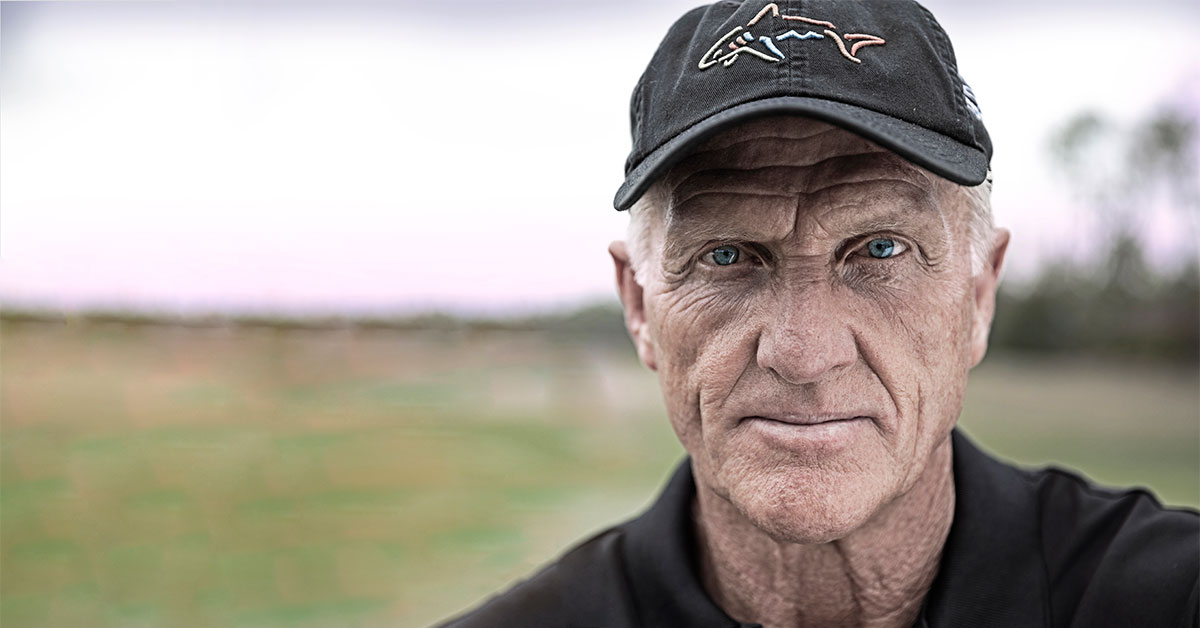
On being super fit in your sixties…
I’m sitting in my gym right now and the minute I’m done with this interview I’m going to start my workout routine for the next hour-and-a-half. I played tennis for two hours this morning and I feel great. My world is in an extremely good place because I keep it there. I don’t take things for granted. A lot goes into maintaining good health as you age but it’s worth every single drop of sweat, trust me. Sitting here today, I haven’t worked out in more than 48 hours because I’ve been so busy with work. But let me tell you, I’m itching to work out again because I can feel my body starting to get lazy. You’ve got to be very aware of yourself and what your body’s telling you. If you start to get lazy it’s very easy to fall out of the routine. I’ve managed to stay in my routine pretty well since we profiled my diet and workout in the August 2017 issue of Australian Golf Digest, and I’m happy with my body. I could go jack up my weights by 10 percent if I wanted to but I don’t need to do that because I’m in good physical condition and relatively pain-free. It’s important for you at home to feel comfortable with yourself, too.
On the secret of keeping young…
They say you are what you eat and I do like to eat well. I don’t eat junk food. Occasionally I’ll enjoy a bag of potato chips but I don’t eat anything white. I consume a lot of fruit, vegetables and fish. Don’t get me wrong, I love red meat but I don’t eat a lot of it… maybe once every 10 days. I primarily stick to different types of fish and chicken. My body enjoys what I put into it. If you’re away for work for a few days or even weeks, and I know this makes things hard from a dietary point of view, but be mindful of what you put into your body and how it can react to certain foods.
On his ultimate baby boomer boot camp…
Let’s say you’re 65, not in the best shape, and want to play the best golf of your life and feel 30 years younger doing it. You’re willing to spend what it takes because you’ve done the hard yards in life and you’re enjoying your retirement. Here’s an action plan: first of all, check your diet. You need your body and brain to be connected. Two, I would start a light stretching program. This will identify the weaknesses in your body and muscles and will tell you if you need to work on your core, work on your quads, or abs, or your back or something else in particular. I would then work on those weaknesses with some stretching routines. Then I would introduce a balance program to see how you correctly balance yourself. Can you stand there and close your eyes and do certain things on one leg and then do it on your other leg? By testing this you can identify if your balance is out and how you can improve that. This is more important than you probably think. By now you can really start developing a total body program that’s going to provide a six-month mission to get yourself into shape and really improve your physical conditioning. It doesn’t happen overnight but once you have that plan in place you’ll have some direction, whether you’re working on it yourself or with your wife or hubby, or with a trainer you’ve brought in. Remember: everybody is a fingerprint so you need to be cautious that if you are being trained by someone, ensure they aren’t giving you a program tailored for someone else. Have a conversation with them and provide feedback on what you’re feeling and how your body is reacting.
On moving back home…
Every time my wife, Kirsten, and I go back to Australia we fall more in love with the Sunshine Coast. There’s no question that would be one place I could go and just chill out, not for the rest of my life because I’d have to be in other places. But we are looking around for a property at the moment, but it’s not as easy as you would probably think because I have roles and responsibilities over here in the States. My business has developed and it’s not going to just stop. Even if I drop dead tomorrow, it’s not going to stop. While my career may have forced me to pack up and leave Australia, my heart never has.



